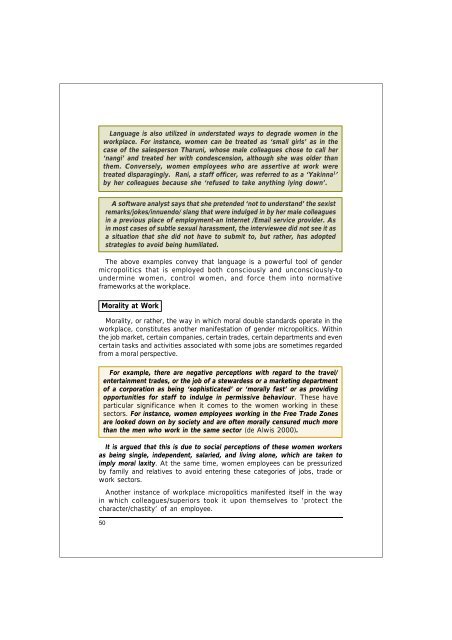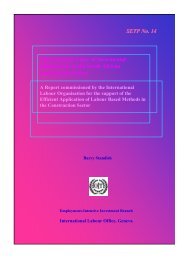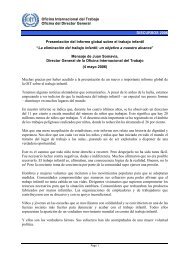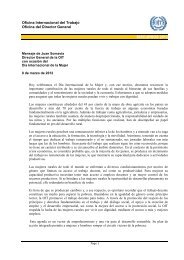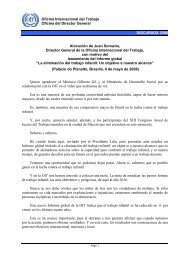Beyond Glass Ceilings and Brick Walls - International Labour ...
Beyond Glass Ceilings and Brick Walls - International Labour ...
Beyond Glass Ceilings and Brick Walls - International Labour ...
Create successful ePaper yourself
Turn your PDF publications into a flip-book with our unique Google optimized e-Paper software.
Language is also utilized in understated ways to degrade women in the<br />
workplace. For instance, women can be treated as ‘small girls’ as in the<br />
case of the salesperson Tharuni, whose male colleagues chose to call her<br />
‘nangi’ <strong>and</strong> treated her with condescension, although she was older than<br />
them. Conversely, women employees who are assertive at work were<br />
treated disparagingly. Rani, a staff officer, was referred to as a ‘Yakinna 1 ’<br />
by her colleagues because she ‘refused to take anything lying down’.<br />
A software analyst says that she pretended ‘not to underst<strong>and</strong>’ the sexist<br />
remarks/jokes/innuendo/ slang that were indulged in by her male colleagues<br />
in a previous place of employment-an Internet /Email service provider. As<br />
in most cases of subtle sexual harassment, the interviewee did not see it as<br />
a situation that she did not have to submit to, but rather, has adopted<br />
strategies to avoid being humiliated.<br />
The above examples convey that language is a powerful tool of gender<br />
micropolitics that is employed both consciously <strong>and</strong> unconsciously-to<br />
undermine women, control women, <strong>and</strong> force them into normative<br />
frameworks at the workplace.<br />
Morality at Work<br />
Morality, or rather, the way in which moral double st<strong>and</strong>ards operate in the<br />
workplace, constitutes another manifestation of gender micropolitics. Within<br />
the job market, certain companies, certain trades, certain departments <strong>and</strong> even<br />
certain tasks <strong>and</strong> activities associated with some jobs are sometimes regarded<br />
from a moral perspective.<br />
For example, there are negative perceptions with regard to the travel/<br />
entertainment trades, or the job of a stewardess or a marketing department<br />
of a corporation as being ‘sophisticated’ or ‘morally fast’ or as providing<br />
opportunities for staff to indulge in permissive behaviour. These have<br />
particular significance when it comes to the women working in these<br />
sectors. For instance, women employees working in the Free Trade Zones<br />
are looked down on by society <strong>and</strong> are often morally censured much more<br />
than the men who work in the same sector (de Alwis 2000).<br />
It is argued that this is due to social perceptions of these women workers<br />
as being single, independent, salaried, <strong>and</strong> living alone, which are taken to<br />
imply moral laxity. At the same time, women employees can be pressurized<br />
by family <strong>and</strong> relatives to avoid entering these categories of jobs, trade or<br />
work sectors.<br />
Another instance of workplace micropolitics manifested itself in the way<br />
in which colleagues/superiors took it upon themselves to ‘protect the<br />
character/chastity’ of an employee.<br />
50


